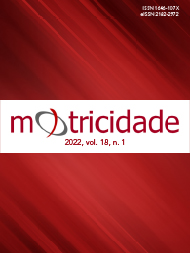Measurement of aquatic competence in toddlers, infants, and children between 6 months and 14 years: a systematic review
DOI:
https://doi.org/10.6063/motricidade.25590Palabras clave:
motor development, swimming skills, water skills, assessmentResumen
The aim of this study was to carry out a systematic review of the literature on tools for measuring aquatic competence in toddlers, infants, and children between the ages of 6 months to 14 years old. A systematic review was carried out following the guidelines of the Preferred Reporting Items for Systematic Reviews and Meta-Analysis (PRISMA) statement. Six of the eight studies selected obtained high valuations based on the Downs and Black Quality Assessment checklist. The studies were classified into three categories, one that proposed tools that measured actual aquatic competence (n=6), the other one that measured perceived aquatic competence (n=1), and the other that measured both (n=1). Five studies measured emotional, social, cognitive, and communicative skills apart from motor skills. Most of the studies focused the proposed assessment tool on a specific age group, while two looked at a broader age group. In conclusion, eight instruments have been developed and validated in recent years for measuring aquatic competence for children between 6 months and 14 years of age from a multipurpose perspective. These have tools designed to facilitate and improve teacher assessment and determine children's perception of their own aquatic competence.
Keywords: motor development; swimming skills; water skills; assessment.
Descargas
Publicado
Número
Sección
Licencia
The authors of submitted manuscripts must transfer the full copyright to Journal Motricidade / Sílabas Didáticas Editions. Granting copyright permission allows the publication and dissemination of the article in printed or electronic formats, and copyrights start at the moment the manuscript is accepted for publication. It also allows Journal Motricidade to use and commercialise the article in terms of licensing, lending or selling its content to indexation/abstracts databases and other entities.
According to the terms of the Creative Commons licence, authors may reproduce a reasonable number of copies for personal or professional purposes, but without any economic gain. SHERPA/RoMEO allows authors to post a final digital copy (post-printing version) of the article on their websites or on their institutions' scientific repository.


